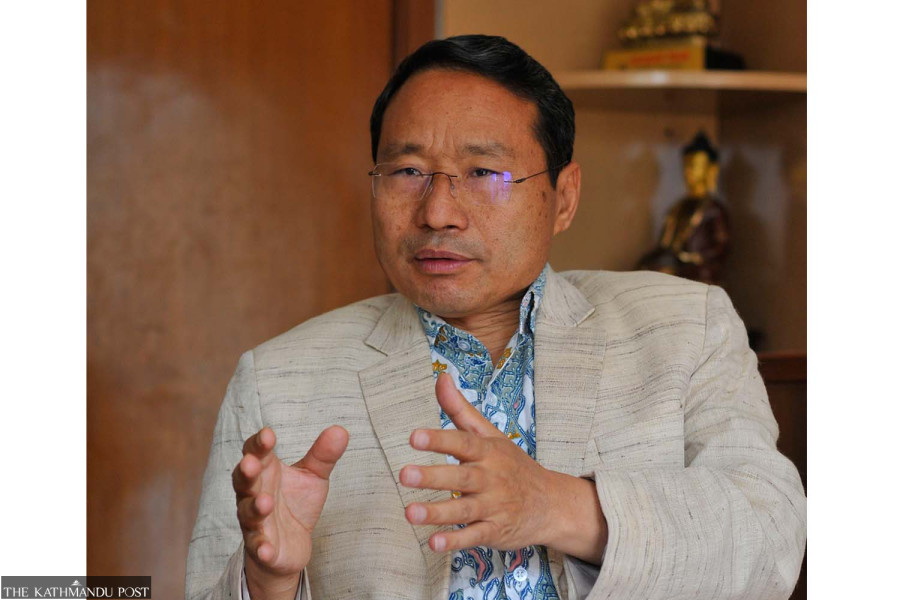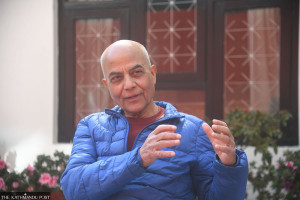Interviews
Communist unity is a good wish, but there’s no solid basis yet
The parliamentary obstruction will continue until the home minister resigns on ethical grounds and an investigation commission is formed.
Purushottam Poudel
With the government unveiling its budget for the upcoming fiscal year in Parliament on May 29, the ruling parties have naturally lauded the budget while opposition parties have criticised it for “lacking direction and ambition”. The Post’s Purushottam Poudel sat down with CPN (Maoist Centre) Deputy General Secretary and former finance minister Barshaman Pun to discuss the contents of the budget, ongoing parliamentary obstruction, allegations against the home minister, the Maoist party’s internal dynamics, and the prospects of communist unity in Nepal.
The ruling parties praise the budget while the opposition parties invariably criticise it. As the government presented the budget on May 29, the pattern of reactions was no different this year as well. Why is this so predictable?
We must evaluate a budget within its specific context. This time, the budget was presented by a strong government of the two largest political parties commanding a near two-thirds majority in the House of Representatives. The public and the opposition expected a substantial, transformative budget from such a government.
The economy has been sluggish for the past four years and is now beginning to return to normalcy. Over the past three to four decades, our average economic growth hovered around 4.5 percent, which is where we currently stand. Given this return to a normal state, the budget should have aimed to rejuvenate the economy by mobilising resources, bold planning, and ambitious spending. However, the government didn’t bring such a budget.
Where does the budget fall short?
Previous governments focused on five sectors for economic transformation, with agriculture as the base and IT as the superstructure. Since nearly two-thirds of our population is still engaged in agriculture, modernising and transforming this sector remains critical. Additionally, IT is globally recognised as a competitive and employment-generating field that Nepal should prioritise. However, this year’s budget lacks sufficient focus on these.
The budget pledges to provide land to 500,000 landless, and the government has tabled a land-related bill in Parliament. How do you view these developments?
In the previous year’s budget, the government announced plans to distribute land to 500,000 landless individuals. However, implementation was impossible due to the need for amendments to existing land-related laws. The problem is that while this government claims to be working in favour of squatters and landless communities, it has introduced a land bill that, in practice, serves the interests of land brokers. That’s why there has been opposition to it inside and outside Parliament. We are open to positive revisions to the legislation that genuinely benefit the landless. The provisions in the bill that only favour brokers must be removed.
Last year’s budget had promised to return up to Rs500,000 to cooperative victims whose savings were misappropriated. The same promise has been repeated this year. Successive governments appear inclined to make promises they can’t fulfil.
It must be implemented. A proper regulatory authority for cooperatives is necessary, but it has yet to be fully functional. Once in place, priority should be given to returning funds to small depositors by confiscating assets of the officials involved in embezzling deposits. Coordination with the Nepal Rastra Bank is vital too. The economic vitality of rural Nepal largely depends on cooperatives and microfinance institutions. The collapse of these institutions is partly responsible for the current economic contraction.
The Parliament has been obstructed for nearly a week. Will this deadlock continue, or is it likely to end soon?
The ongoing obstruction results from the serious allegations linked to the visit visa scam, in which individuals from Home Minister Ramesh Lekhak’s secretariat appear to be involved. The official implicated, who was deputed to the airport immigration by the minister himself, has long had a questionable track record. The joint-secretary was already under the watch of the Commission for Investigation of Abuse of Authority (CIAA) and was transferred to the home ministry hours before arrest.
The minister clarified in a press conference that the accused official had worked under previous ministers, too. It came across less as a defence and more as an implicit admission of mishandling. In this context, it would have been appropriate for the home minister to resign on moral grounds, allowing an impartial investigation to proceed. This is precisely what we are pressing for. The parliamentary obstruction will continue until the home minister resigns on ethical grounds and a fair investigation commission is formed.
The ruling party argues that a minister can’t be held accountable for actions committed by any subordinate official.
We are not alleging that the home minister is personally engaged in wrongdoing. Nor are we demanding his resignation simply because an employee under him made a mistake. Such incidents have occurred in the past and may happen again. However, this is a matter of moral responsibility.
When members of the minister’s secretariat have prior cases against them, when individuals are transferred internally with backdated letters, when a controversial official is posted to a sensitive location like the airport on the minister’s instruction, and then pulled back just before arrest—these are not coincidences. In addition, the attempted transfer of the officer investigating the case from the anti-graft body makes the pattern clear. These circumstantial facts raise serious questions about the minister’s role. Therefore, a resignation is warranted to pave the way for an impartial probe. There are precedents where officials have resigned, been cleared of wrongdoing, and then returned to their posts. The same principle could apply here as well.
Lately, royalist groups have been staging protests, demanding the restoration of the monarchy and the Hindu state. Leaders of major political parties have challenged former king Gyanendra Shah to contest elections if he wishes to return to power. Is it fair?
When there was the king, didn’t the people have to take up arms to bring about a republic? Didn’t tens of thousands sacrifice their lives for it? At that time, even speaking against the monarchy could land you in jail or cost you your life. Today, those in favour of restoring the monarchy can express their views publicly, without fear of arrest, bullets, or going underground. That is the freedom in a democracy and the republic.
It would be unconstitutional if they wished to bring back the monarchy through a struggle. In that case, they must declare they defy the constitution and are ready for a confrontation. Otherwise, under the current framework, there is no constitutional ground for the king’s return. The constitution clearly states that everything except sovereignty and territorial integrity can be changed. In such a liberal setup, if they genuinely have public support, they should seek to advance their agenda through elections. Why take to the streets?
What we need is further refinement of democracy and republicanism. The current system’s shortcomings have indeed raised questions about political parties. But that is not a reason to abandon the system; it is a call for political parties and their leaders to reform. We must begin with self-reflection.
Last year, during a standing committee meeting of the Maoist Centre, it appeared that you and fellow deputy general secretary Janardan Sharma stood together on certain issues. It reflected in the party’s student wing convention as well. Was it a challenge to the leadership?
That’s not accurate. It’s not true that the two deputy general secretaries were attempting to confront or challenge the chairman. Discussion and debate are a part of party dynamics. It would be misleading to frame such activities as attempts to challenge the leadership or as evidence of deep divisions within the party.
If there is no division, why did party chair Pushpa Kamal Dahal feel the need to field his loyalists, through deputy general secretary Shakti Basnet, during the student wing’s convention?
Holding elections to pick leaders of sister organisations contributes to intra-party democracy. Individuals may choose to support one candidate over another—that is normal. However, it is not true that the party chair was directly involved in the student elections.
There has been renewed talk about the possible unification of communist parties in Nepal. Is it true?
Unification among communist parties is not possible immediately. The Maoist Centre and the CPN-UML have experienced what it means to unite and then split. There are a sequence of events and lessons learnt. To bridge that broken link, we formed a joint government. We had no particular issue working with the Congress in the prior government, but the rationale behind aligning with another communist party was ideological compatibility. However, that partnership didn’t last, mainly because KP Sharma Oli betrayed the understanding. Therefore, our party is not ready for yet another communist unification of that kind. We may discuss it in future in a new context if the environment becomes conducive. Currently, the unification agenda is not on the table.
Some argue that by welcoming former Vice President Nanda Bahadur Pun back in the Maoist Centre, your party has made it easier for former President Bidya Devi Bhandari to return to UML politics. Is there a game plan?
We welcomed Nanda Bahadur Pun back because he expressed a desire to be active in the party again. Until now, no former President or Vice President had returned to active politics. After Comrade Pun expressed his willingness to work in the party, and after extensive discussions, the party decided to give him a role. What the UML or others do is their internal matter.
Some domestic or international actors are reportedly trying to forge unity between the Maoist Centre and the UML. Is it true?
Some friends or well-wishers may think it would be good for communist parties to come together, which is not a bad idea. But we believe our politics must stand its ground. The objective ground for unification has not yet emerged.
Lately, some influential Nepali Congress leaders have publicly said that they had suggested using the term “freedom of religion” instead of “secularism” while drafting the constitution—but that this was blocked due to Maoist pressure. What’s the matter?
This is nothing more than an attempt to mislead the people in the name of religion. In fact, secularism was not first introduced through the constitution or even the Interim Constitution. The reinstated House of Representatives declared it in a meeting [on May 18, 2006] following the People’s Movement of 2006—in which the Maoists were not even present. To blame the Maoists now is simply a distortion of history. What we believe is that a country cannot have its religion.




 10.12°C Kathmandu
10.12°C Kathmandu



.jpg&w=200&height=120)








